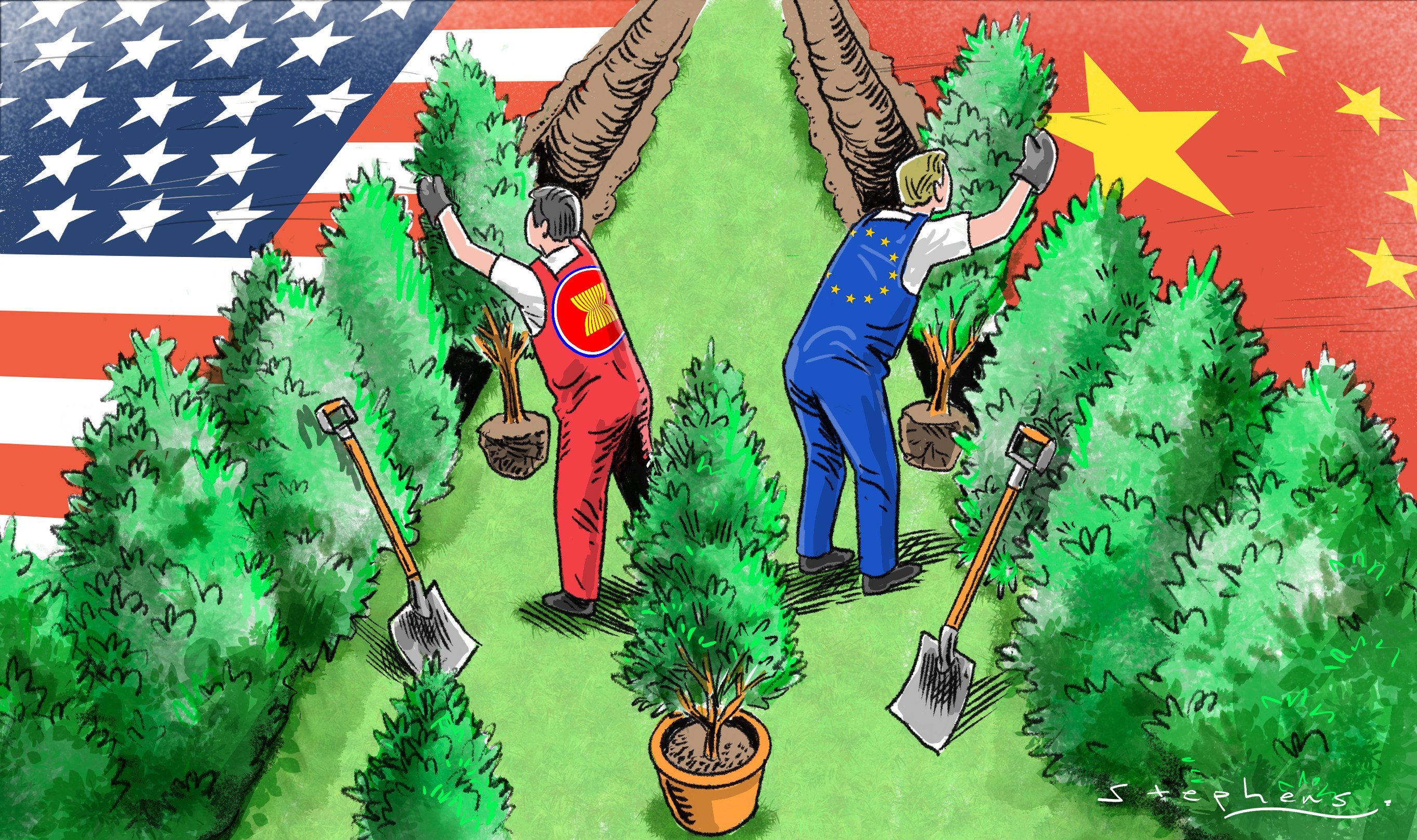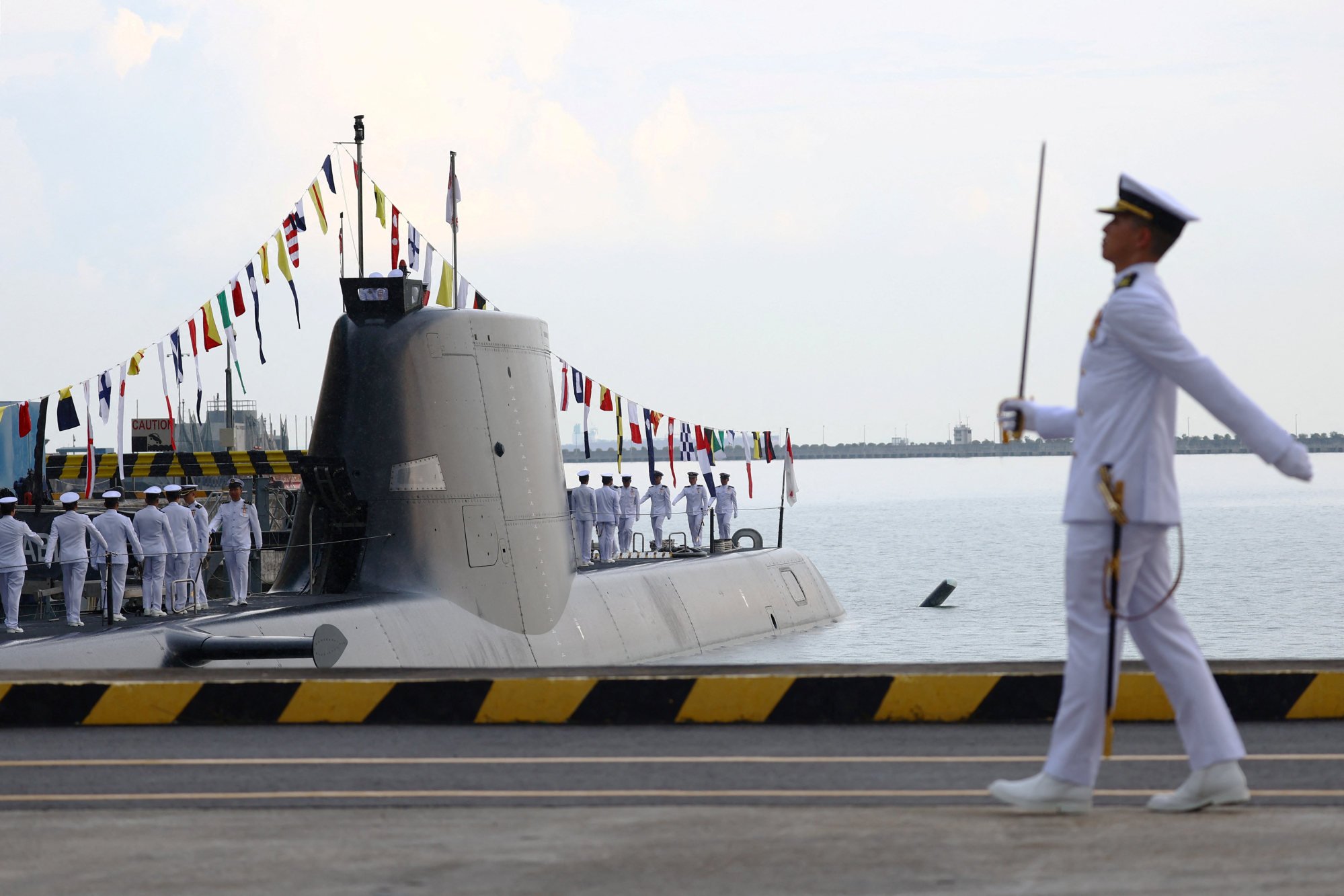Why Europe and Asean are aligning to hedge against US, China dependence
Despite diplomatic and ideological differences, the EU and Southeast Asia’s trade and defence needs are bringing the two sides together

French President Emmanuel Macron is set to become the first European leader to deliver the keynote address at the Shangri-La Dialogue in Singapore later this month. Arguably Asia’s most influential security forum, the dialogue has regularly hosted top defence and foreign policy officials and experts from around the world to discuss pressing geopolitical challenges and enhance cooperation among like-minded powers.
Macron is set to join a storied roster of world leaders to deliver keynote addresses, including former Japanese prime minister Fumio Kishida, India’s Prime Minister Narendra Modi and Australian Prime Minister Anthony Albanese. At the dialogue, Macron is set to lay out Europe’s vision of a rules-based international order and assert its strategic autonomy against the backdrop of US-China global rivalry.
He is also expected to attend the Asean summit in Kuala Lumpur before travelling to Indonesia, the region’s largest nation and de facto leader. While in Indonesia, he will join President Prabowo Subianto at a retreat at a military academy in Magelang, Central Java.
While the Philippines is not on Macron’s itinerary, it, like Indonesia, is rapidly developing relations with key European powers. It hosted observers from several European nations – including four for the first time – during this year’s Balikatan exercises, which took place close to flashpoints in the South China Sea and Taiwan. Last year, France was the only European power to directly take part in the Philippine-US war games.
France and Germany are bolstering defence ties with the Philippines, and the European Union is pursuing a free-trade agreement with both Manila and Jakarta. Philippine President Ferdinand Marcos Jnr, who was last year’s keynote speaker at the Shangri-la Dialogue, is considering a visit to France later this year, possibly as soon as the two sides finalise a new Reciprocal Access Agreement and other major defence deals.
After spending decades in the shadows of superpowers, key European and Asean nations are rapidly developing bilateral relations as part of a broader middle-power diplomacy among like-minded nations. Eager to avoid dependence on either the United States or China, the two sides have developed an increasingly symbiotic relationship amid shared strategic and economic interests in an increasingly multipolar world order.
The US and China undoubtedly remain central to the foreign policy of both Europe and the countries that make up the Association of Southeast Asian Nations. The US remains the most important defence partner and a major export destination for European nations. Russia’s invasion of Ukraine exposed Europe’s dependence on US military muscle and convening power. As for Southeast Asian nations, China is not only their biggest trading partner but also a top source of investment, including in hi-tech manufacturing and big-ticket infrastructure projects.
Moreover, Europe and Asean have divergent takes on major global flashpoints. Southeast Asian nations, with the notable exception of Singapore, refused to join Western sanctions against Russia. In fact, key Asean nations such as Vietnam and Indonesia are exploring expanded military relations with Moscow, either through new military exercises or large defence deals.
Last year, Hanoi even defied the Netherlands-based International Criminal Court’s arrest warrant for Vladimir Putin by hosting the Russian president. During his trip to Moscow this month, Malaysian Prime Minister Anwar Ibrahim invited Putin to attend Asean’s summit of world leaders later this year.
Meanwhile, Asean countries have been critical of Europe’s apparent double standards over Israel’s war in Gaza. Core nations such as Indonesia, Vietnam, Malaysia and even US allies in the Philippines, Thailand and Singapore have expressed solidarity with the Palestinian people.
Despite their differences, however, Europe and Asean share an increasingly similar strategic culture. As middle powers, they shun breaking up with either the US or China but are also wary of becoming dependent on either. Accordingly, both sides are intent on enhancing their own strategic autonomy despite their own entanglements with the competing superpowers.
The two sides also have much that complements the other. The EU is keen on tapping into booming consumer markets and the massive and youthful labour force of key Southeast Asian nations, home to the world’s fastest-growing middle classes. Facing steep tariffs from the US and direct competition from China, Europeans are scrambling for new markets for their industrial and defence exports. Singapore and Vietnam already have free-trade deals with the EU, and bilateral trade talks continue with Indonesia, the Philippines and Thailand.

Facing growing geopolitical uncertainties in their respective neighbourhoods, Europe and Asean are also keen to expand their defence ties. Similar to his counterparts from Germany and the Britain, Macron is expected to push for sales of advanced weapons systems to Indonesia, which is in the midst of a major defence build-up. Last year, Singapore received the last of four Type 218SG German-made submarines, while Thailand has been historically a major customer for European defence exports.
France and Spain, meanwhile, are keen on selling submarines to the Philippines, which is pursuing an extensive military modernisation programme. Although considered a frontline US ally, the Marcos administration has sought closer ties with European nations to diversify foreign relations. This both lessens the country’s historical dependence on the US but also helps Marcos keep domestic critics at bay, especially the Duterte dynasty, which favours warmer ties with China.
The upshot is a highly symbiotic relationship between Europe and core Asean nations. Despite their ideological and diplomatic differences, they are gravitating towards each other as a hedge against geopolitical uncertainty and intensified superpower rivalry.